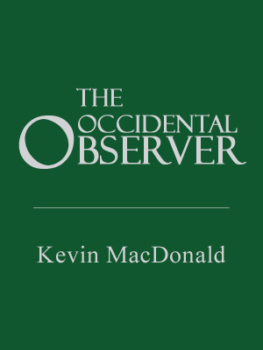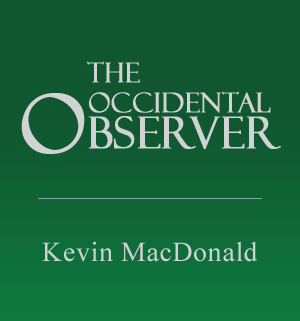Lack of Self-Awareness (Self-Deception?) at The Tablet
Tablet came out with an article relating level of education to attitudes toward Jewish issues. As they note, it’s long been a bedrock belief among Jews that higher levels of education are linked to lower levels of anti-Jewish attitudes—think decades of Jewish-owned media portraying people with anti-Jewish attitudes as illiterate hillbilly types with some missing teeth. But, as the authors note, the problem for doing this kind of research is that educated people are much less likely to agree with classic anti-Jewish statements like “Jews have too much power in international financial markets” or “Jews don’t care what happens to anyone but their own kind” (although there’s more than a grain of truth in them). And this could well be because educated people are more aware that such statements are simply not the sort of thing one says in polite society and if it’s one thing educated people want, it’s to feel that they are good people.
But this study shows or at least suggests that in some areas educated people are more “anti-Semitic” based on asking people with different education levels similar questions but with one set of subjects given questions related to a Jewish example, another set of subjects given questions related to a non-Jewish example. For example, one set of subjects was asked a question such as “a person’s attachment to another country creates a conflict of interest when advocating in support of certain U.S. foreign policy positions.” One set of subjects got Israel as an example, while the other got Mexico. More subjects thought loyalty created a conflict of interest when Israel was the example than with Mexico. Their theory was that even though particular individuals will have different opinions on the different questions, on average the responses should be the same for the two groups.
The report only includes three more examples: whether the government should set minimum requirements for what is taught in private schools,” with Orthodox Jewish or Montessori schools given as the illustrating example; whether “the U.S. military should be allowed to forbid the wearing of religious headgear as part of the uniform,” with a Jewish yarmulke or Sikh turban offered as illustrating examples; and whether public gatherings during the pandemic “posed a threat to public health and should have been prevented,” with Orthodox Jewish funerals or Black Lives Matter (BLM) protests offered as illustrating examples.
The Orthodox Jewish/Montessori example showed no difference, but the other three showed differences with the educated responding in a more Jewish-critical way, although, as you might expect given that more educated people trend to the left, more educated people wanted more government control over education.
The question on wearing religious symbols in the military seems clean and suggests a distaste for religious Jews—interesting, but that may not translate to distaste for the many very powerful and influential Jews who don’t wear outward signs of Jewish identity.
The largest effect of education was the Orthodox funeral/BLM item for people with more than a four-year degree (a difference of 36 percentage points). I suspect that more educated people are generally way more enthusiastic about BLM, so that the item doesn’t really get at being critical of Jews. And again it’s Orthodox Jews, so it may not apply to the people who run Hollywood, etc.
Re the loyalty issue, I suspect that more highly educated people are more aware of Jewish influence on U.S. foreign policy, despite such news being confined to the fringes of political discourse. In other words, they are simply more aware of the reality of U.S. subservience to the Israel Lobby and the incredibly costly wars that has resulted in, not to mention the $3.8 billion/year, and high-profile spying cases like the recently repatriated Jonathan Pollard—not to mention support for Pollard in the Jewish mainstream. Israeli oppression of the Palestinians may also be a factor, even though it’s not directly relevant to the loyalty issue. More educated people then to be more liberal and are likely more aware of the oppression. It’s well known that support for Israel is dwindling on the left. As is often the case, being anti-Jewish is simply about knowing more of what’s going on.
Of this bunch, the loyalty question is by far the most interesting because it gets at a central feature of Jewish activism. And it suggests that more educated people are aware of what should be obvious to the non-braindead—that America has indeed suffered greatly because of the subservience to Israel and that this is entirely due to the activism of American Jews.
But of course, for a very Jewish magazine like the Tablet, any hint that educated people are not completely enthusiastic about Jews is cause of alarm and activism. After all, educated people have more power, and it certainly behooves any community to understand where the real threat lies (same goes for White activism, which is why we stress Jewish issues at TOO). But what really bothers the authors is that “educating” the public may not be the answer. Jews have always relied on their very large influence on the mass media and academic opinion to provide positive images of Jews and completely omit anything that might suggest conflicts of interest between Jews and non-Jews. Since the authors are so confident that there could never be any serious criticism of the Jewish activist community, they suggest that providing facts is not enough to rectify the situation:
Strategies for addressing intolerance in general, and anti-Semitism in particular, tend to revolve around the belief that group-hatred is caused by ignorance, and that the solution is more education. Yet if more-highly educated people are more hostile with respect to Jews, higher educational levels and more courses and training could increase prejudice, rather than diminish it.
This of course leaves out the very strong possibility that more educated Americans are more aware of Jewish power and in particular how Jewish power has been focused on Israeli interests at the expense of American interests. Such information is leaking out despite their best efforts (to date) to shut down negative information about Israel in the mainstream media and even make criticism of Israel illegal, as with the recent spate of anti-BDS laws in several states.
So what to do?
At the very least, it seems that an education that simply provides information about historical events, civil liberties, and other cultural groups is insufficient. Addressing anti-Semitism and prejudice more generally may require the cultivation of virtue. Specifically, it requires the formation of a kind of character that is not only familiar with other outgroups and democratic norms, but also has the integrity to behave in ways that demonstrate consideration of their interests and restraint in the use of political power in the pursuit of personal interests.
This shows an amazing lack of self-awareness, even self-deception. Anyone with the slightest understanding of where the power of the Jewish community has been directed realizes that Jewish power has fundamentally been arrayed against the interests of the traditional White majority.
In fact, the activist Jewish community clearly has not had the integrity to respect the legitimate interests of White Americans, nor have they used restraint in their pursuit of their interests. They have not done unto the White majority as they would like the White majority to do unto them. In their long history of conflict with surrounding peoples, Jews have never been treated better than they have throughout the West, at least since World War II.
In the contemporary U.S., besides the conflict between Israeli and U.S. interests, Jewish activism is strongly focused on curtailing free speech, especially on diversity issues and most especially on assertions of White identity and White interests. And it is strongly focused on supporting replacement-level immigration which is lessening the power of Whites and will ultimately result in Whites being unable to achieve their interests in a democratic manner. And much worse if Whites become a relatively powerless minority.
Immigration is indeed Exhibit A in the Jewish disregard of White interests—the topic of Chapter 7 of The Culture of Critique where I show that the activist Jewish community rejected the ethnic status which was the aim of the 1924 immigration law—a status quo that was obviously in the legitimate interests of White America as the founding population of the country—and that the main Jewish motivation was fear that a relatively homogeneous White America would inevitably turn on the Jews. Some examples:
Svonkin (1997, 8ff) shows that a sense of “uneasiness” and insecurity pervaded American Jewry in the wake of World War II even in the face of evidence that anti-Semitism had declined to the point that it had become a marginal phenomenon. As a direct result, “The primary objective of the Jewish intergroup relations agencies [i.e., the AJCommittee, the AJCongress, and the ADL] after 1945 was . . . to prevent the emergence of an anti-Semitic reactionary mass movement in the United States” (Svonkin 1997, 8).
Writing in the 1970s, Isaacs (1974: 14ff) describes the pervasive insecurity of American Jews and their hypersensitivity to anything that might be deemed anti-Semitic. Interviewing “noted public men” on the subject of anti-Semitism in the early 1970s, Isaacs asked, “Do you think it could happen here?” “Never was it necessary to define ‘it.’ In almost every case, the reply was approximately the same: ‘If you know history at all, you have to presume not that it could happen, but that it probably will,’ or ‘It’s not a matter of if; it’s a matter of when.’ ” (p. 15).
The AJCongress, the largest American Jewish organization at the time, testified during the Senate hearings on the 1952 law that the 1924 legislation had succeeded in preserving the ethnic balance of the United States, but it commented that “the objective is valueless. There is nothing sacrosanct about the composition of the population in 1920. It would be foolish to believe that we reached the peak of ethnic perfection in that year.”
Recently I became aware of Otis Graham’s 2004 book Unguarded Gates: A History of America’s Immigration Crisis. Graham notes that, besides being the most effective force of liberalized immigration, the Jewish lobby on immigration “was aimed not just at open doors for Jews, but also for a diversification of the immigration stream sufficient to eliminate the majority status of western European so that a fascist regime in America would be more unlikely” (80).
I firmly believe that if Jews had had respect for the legitimate interests of White Americans rather than consistently engaging in ethnic hardball against the interests of White America (especially in the post-World War II era when anti-Semitism had been completely marginalized), we and the entire West would be in a very different situation.
The authors conclude:
As Harvard professor and Yiddish scholar Ruth Wisse has argued, anti-Semitism has not thrived because of ignorance, but because it “forms part of a political movement and serves a political purpose.” Those political causes making use of anti-Semitism are increasingly favored by the well-educated in this country. Countering the anti-Semitism of the well-educated will be a political and moral struggle, not one that can be addressed by conventional approaches and conceptions of education.
I agree with Wisse. If indeed there is an anti-Jewish movement in America, it will be aimed at a political purpose for the Whites involved: rectifying historic wrongs inflicted on White America.












